In celebration of Hispanic Heritage Month, observed every year from September 15 – October 15, Atlas will highlight our Hispanic colleagues who share how their culture has shaped them. Today, we introduce you to Desktop Technician/Mobility Specialist Leo Venega.
How long have you been with the company and what are your primary responsibilities?
I was first hired as a contractor in 2015 and joined the Company full-time in 2016. So, I’m coming up on six years with Atlas.
As a Mobility Administrator for end user services. I am the main point of contact for our team, for users needing anything related to mobility, such as Company cell phones, iPads, and Crew PCDs.
What do you enjoy most about being part of the Atlas team and your role specifically?
I have always been a “fixer.” I like solving problems and I like helping people and, in my role, I get to do that all the time. It’s very rewarding for example, when I receive a call from a pilot halfway around the world with a problem and my team and I are able to resolve the issue and get them going again. I like to think that it’s comforting for the crew to know that they can finish the leg that they’re on no matter where they are or what time they need help.
How did you find Atlas?
I used to own a computer store. My business partner and I developed a ruggedized tablet that we planned to market to utility companies and such. At the same time, the FAA (Federal Airlines Administration) had approved the use of tablets for cockpit use, so a friend of mine who was an Atlas Air pilot offered to introduce me to Marco Kleiner, Director, IT, to see if our tablets might work for Atlas. My tablet was an Android-based solution and unfortunately it was not a good fit for what Atlas was looking for, so we weren’t able to work together. About a year later though, Marco reached out to see if I would be interested in configuring iPads for the crew. I thought it was a great opportunity and to get involved with a really interesting organization and one year after that, I was a full-time, Atlas employee. The whole experience was a good reminder that first impressions really do matter. I didn’t get to work for Atlas the first go-round, but here I am today, coming up on my six-year anniversary.
What prompted you to consider aviation as a career?
I’ve always thought airplanes were cool. I was that kid who had a bedroom ceiling full of airplanes. Growing up, I wanted to be an Air Force Fighter Pilot. Life took a turn, and I wasn’t able to pursue that dream, but I never lost that fascination for the technology and engineering behind airplanes. The dream really did come full circle though, today, I’m on the third floor of the Miami Training Center, working right in the thick of a busy airport and training center and I see airplanes all day. Of course, my favorite moments are when I catch an Atlas airplane taxiing in front of me!
What is the best part about working in aviation?
I think what is so exciting about working in this industry is being a part of what aviation makes possible. We are in the midst of changing humanity by moving people and goods all around the world in an incredibly fast and honestly, cost effective mode. I tell everyone if you want the perfect blend of technology, innovation and world reach, then you should get involved with air cargo.
Please tell us about your Hispanic heritage and how your culture inspires you.
I was born in Cuba, and I was seven years old when we left and moved to Spain. We had every intention of staying there, but shortly after arriving in Spain, there was a socialist upheaval and my father felt that one revolution in a lifetime was enough for him. So, we moved to Miami.
I feel very blessed to have moved to the United States, and particularly to Miami, which affords me the opportunity and freedom to celebrate my Hispanic heritage. I am very proud of my heritage, and I enjoy sharing its incredible history and contributions as well as educating others on what it’s like to be Cuban-American. I am particularly inspired by the Cuban poet, José Martí. He wrote beautiful poetry about Cuba and what it means to be Cuban. His poetry inspired the song Guantanamera, which is the quintessential Cuban song.
Tell us a little bit about your upbringing and the values instilled in you.
My father was my hero. He left his family in Cuba, started a new life in Spain, all the while he toiled for a year by himself while arranging our immigration papers finally bringing all of us over. He was a land surveyor in Spain and did well and as a family, we were very comfortable. When we came to the United State, he was in his 40s and didn’t speak the language. None of his licenses, or diplomas were recognized here, and he had to start all over. Which he did, he started a company and once again, he did well. His dedication to providing for his family and his work ethic were exemplary. That can-do, never give up attitude is now ingrained in me.
My father made a point of telling me and my siblings that he didn’t care what career we pursued, as long as we were committed to being the best at what we chose to do. That has become a cornerstone of who I am – I always want to be the best at what I’m doing.
What does Hispanic Heritage Month mean to you?
I think, as a Hispanic, it’s a good reminder to study up on our culture. It’s an opportunity to learn something you might not have previously known. We have a rich, rich history and Hispanic Heritage Month is a great opportunity to celebrate all who came before us and their contributions.
What would your colleagues be most surprised to learn about you?
I am a huge motorcycle aficionado. It all started when I was 15. My older brothers, who were mechanics, brought cars and motorcycles home to work on them and I started helping them. The more I learned about motorcycles, the more I became enamored with them. Eventually, I opened my own shop and as a way to promote it, I decided to build a bike for my friend who was racing and put the name of the shop on the side of it.
The problem was, he wasn’t very fast. And he crashed a lot. One day it occurred to me that I could probably do better. And so, I went to racing school, I got my license and started racing professionally. I competed in a few series in Florida and Georgia. I ended up winning two state championships. I moved into the national series and did that for a few years, consistently placing in the top ten.
I’ve stopped racing, but I still love motorcycles. I’ve been all over the United States on my Harley Davidson touring motorcycle. I find it really centers me and gives me such an appreciation of the natural beauty of this country.

Photo featuring Leo Venega
In celebration of Hispanic Heritage Month, observed every year from September 15 – October 15, Atlas will highlight our Hispanic colleagues who share how their culture has shaped them. Today we introduce you to Claudia Montes, Lead Training Records Administrator.
How long have you been with the Company and what are your primary responsibilities?
I have been working for Atlas for five years and I am responsible for tracking and maintaining records related to employee training and development to ensure we are all in compliance with contributing to the Company’s goals.
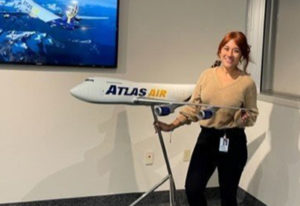
Photo featuring Claudia Montes
What do you enjoy most about being part of the Atlas team and your role specifically?
What I like most about Atlas is the culture. The Company is not only committed to serving its customers but is also committed to responding to employee needs by actively engaging with us. I also greatly appreciate that Atlas Air is a leading aviation company and that its success is a gateway for professional growth.
My favorite part about my job is connecting with my team so I have a good understanding of their needs, opinions and concerns. Additionally, my day-to-day requires a lot of attention to detail and that active dynamic is what keeps me highly motivated to contribute to the Company’s success.
How did you find Atlas?
I first heard the name Atlas Air in 2014 when I was working for a small charter airline. I was interested in working for a bigger airline and a colleague of mine referred me to Atlas. I joined the Company in 2017 and started as a Training Records Administrator. Atlas has given me the opportunity to grow my career and to experience firsthand how aviation evolves every single day.
What prompted you to consider aviation as a career?
When I was in college, I was considering several different career paths within Hospitality and Tourism Management, which was my major. One of my assignments was to write an essay about the economic impact of a specific career. After two weeks of research, I learned that the aviation industry had a lot of growth opportunities and I believed that my career and financial goals would be achieved if I followed this path.
What is the best part about working in aviation?
I think the best part about working in aviation is the opportunity to connect with and learn about so many different cultures. It’s also very exciting to be a part of such a dynamic and exciting industry.
Please tell us about your Hispanic heritage and how your culture inspires you?
I was born in El Salvador but raised in Mexico. To me, being able to learn and be a part of two different cultures was an amazing experience. It was incredibly inspiring to see how both cultures keep their traditions and dialect alive. I also appreciate tourists’ interest in learning about the food, festivals and certain sacred rituals that makes each culture unique.
Tell us a little bit about your upbringing and the values instilled in you.
I come from a family of five and moving from one country to another made us stronger. We have tackled many challenges such as language barriers, cultural differences, leaving my grandparents behind and having to restart our lives in a new place. We didn’t see these life- changing events as something negative but instead viewed it as an opportunity to see life in a different perspective, pushing us to adapt. After 14 years of living in the United States, we continue to dedicate quality time to each other and remind each other that the best is yet to come.
What does Hispanic Heritage Month mean to you / how are you celebrating Hispanic Heritage Month?
Hispanic Heritage Month means understanding that we are all equal despite having different point of views. It’s a reminder that respect and understanding will be always fundamental for a person’s development.
I am celebrating Hispanic Heritage Month by signing my daughters up for several virtual tours of museums in Mexico so they can start learning more about where I’m from.
What would your colleagues be most surprised to learn about you?
My colleagues would find it surprising how quickly I adapt to changes. I am very open-minded and I am always striving to acknowledge that we all benefit and grow from one another.
Atlas Air Scholarship Fund’s inaugural employee dependent scholarship program drew an impressive group of candidates. The 10 recipients of $3,000 scholarships are students from diverse backgrounds, pursuing lofty goals ranging from entertainment and politics to aviation and medicine. The program was administered through Scholarship America, which selected the recipients from the pool of eligible applicants, all dependents of Atlas’ U.S.-based employees. We congratulate the recipients and their proud parents.
Carlota (Carly) is inspired by her father, Atlas Air 737 Check Captain Michael Mortiz. The 20-year-old senior, who is studying aeronautics at Kent State University, loves to travel and looks forward to a career crisscrossing the globe as a professional pilot.
“My dad has definitely impacted my education and carrier decisions,” Carly said. “He is always excited about going to work even after so many years, which can be rare nowadays. Not only does he love his job, but he loves the company he works for, and ultimately, I think that is something everyone wants and deserves.”
Michael said it is especially gratifying that Carly has been rewarded for her dedication by his own employer.
“This scholarship opportunity is of tremendous value to our family,” Michael said. “Carly has always been hard working and driven and has gone above and beyond to achieve her goals in both academics and sports. Because of her work ethic and perseverance, she has seen a lot of doors open. As an Atlas employee, I am very grateful to Atlas for rewarding well-deserving students with this very generous scholarship.”
***
Ryan, a junior studying biological science at Florida International University, is completing flight training to earn his commercial pilot license as he follows a well-defined path toward becoming an astronaut.
“I strive to make myself better qualified to achieve my ultimate goal of becoming an astronaut,” said 20-year-old Ryan, who is from Miami and enjoys playing piano and tending to his garden. “Atlas is supporting me to reach my goals by making college more financially viable and allowing me to allocate my finances to flight training. Being chosen for the scholarship is an amazing opportunity, and I’m very grateful to my father for always pushing forward and looking out for me and my family.”
Ryan’s father, First Officer Rolando Vidal, said Ryan has always dedicated himself to his passions.
“Ryan has always been committed to completing as many requirements as he could get, so that hopefully one day he could fulfill his goal of becoming an astronaut,” Rolando said. “He is very grateful and focused, and his desire to meet his goal has never diminished.”
***
Christin is a senior working toward a Bachelor of Science in Dance Management at the Ann Lacy School of American Dance and Entertainment at Oklahoma City University. After college, she hopes to work with the Walt Disney Company or Universal Studies in Florida – a long way from her hometown in Kenai, Alaska.
Christin hopes to work in the film and television industry as a director and producer while continuing to remain involved in the live-entertainment world. She said she is grateful to have been chosen for the Atlas Air scholarship, and she intends to pay it forward. After establishing herself in the industry, her goal is to open a non-profit dance center aimed at the under-served populations of her community, wherever that may be.
Christin’s father, First Officer Richard D. Baker, said he and his wife Carla are proud of the dedication their daughter has shown to her chosen field.
“Christin has been laser focused on her future in the dance/entertainment industry since early in her high school experience,” he said. “She is now the hardest working 21-year-old we know while still being a very caring person. We love her dearly.”
***
Arkansas Tech University senior William is studying business management and pre-law in preparation for a law career that he hopes will lead to a future in politics.
“Ten years from now, after what will hopefully be a successful stint in corporate law, I wish to become politically involved in the great state of Texas as a politician or attorney general,” said William, 22, who is from Fort Worth and plays for the university’s baseball team.
He also is a member of the Student Athletic Advisory Council, the National College Athlete Honor Society and Beta Gamma Sigma international honor society for collegiate schools of business.
“I am so very proud of Will for all that he has accomplished so far,” said his father, Line Maintenance Manager Jay Horton. “He’s very deserving of the Atlas scholarship.”
***
Wesley, a freshman studying marketing at the University of Cincinnati, is pursuing a career in real estate.
“In 10 years, I hope to be selling homes in Cincinnati and growing my brand to reach new states,” said Wesley, who is from Harrison, Ohio, and enjoys playing guitar, staying fit and working on his personal development.
“Being selected (for this scholarship) confirmed to me that the hard work I’ve been putting into myself has been paying off. The journaling and writing that I knew I needed to be doing – but didn’t always want to do – has advanced my mind to something that is very capable. Winning the scholarship will only increase my momentum.”
In celebration of Hispanic Heritage Month, observed every year from September 15 – October 15, InsideAtlas will highlight our Hispanic colleagues who share how their culture has shaped them. Today, we introduce you to 747 Captain and Check Airman Teresa Dodson.
How long have you been with the company, and what are your primary responsibilities?
I started with Polar in 2002 and later transitioned to Atlas.
As a Check Airman, I supervise flying for new hires and new captains and introduce them to the Atlas operating line.
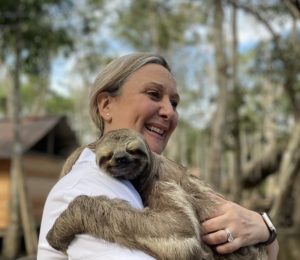 What do you enjoy most about being part of the Atlas team and your role specifically?
What do you enjoy most about being part of the Atlas team and your role specifically?
My favorite part of my job is flying with new hires. I get to experience the excitement they have when they first come to the company and are learning how our operation works. It reminds me of my first few years at the company.
How did you find Atlas?c
I like to say that Atlas found me, since I was at Polar. I flew for many years with a few different Alaskan airlines and a few of my former coworkers joined Polar and suggested I look into it. I did and have been part of the Atlas Air Worldwide family ever since.
What do you like best about working here?
I love the people. We are such a diverse group from a variety of backgrounds, both personally and professionally. I love coming to work and meeting new people. My colleagues are family to me.
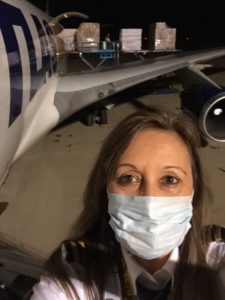 What prompted you to consider aviation as a career?
What prompted you to consider aviation as a career?
My father was a pilot in Spain, but he was very traditional, and he didn’t think women should be pilots. In fact, there is a recording of my dad and I having a conversation when I was three years old. He asked me what I want to be when I grew up and I answer, “a pilot.” He responds and says “well, you are a girl, you can be a flight attendant.” Even at three, I asserted that I wanted to be a pilot.
My parents wanted me to be a lawyer and sent me to law school in Madrid (in Spain, law school begins immediately following high school and is a five-year program) but during my third year of school, I decided to give my dream a chance and moved to Alaska to be a pilot, since that’s where the most aviation opportunities were at the time.
What is the best part about working in aviation?
I like that aviation is a dynamic industry – everything is constantly changing, like new airplanes and new technology. There is always more to learn, which keeps me interested.
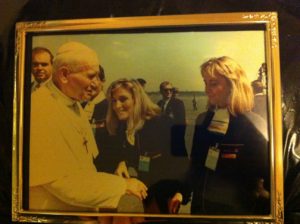
Please tell us about your Hispanic heritage and how your culture inspires you.
I grew up surrounded by hard working, loyal people my family, friends and neighbors. I think those qualities are what contributed to my very strong work ethic and dedication to my career, my colleagues and my community.
I was the fourth woman in Spain to get a commercial pilot’s license. My generation was born under a military dictatorship. We were raised with strict traditional and religious values in a society with very limited options for women outside the role of mother, housewife or caregiver. The women in my generation pushed down walls to become unstoppable and we changed our society. I had to leave my country to fulfill my dream to its full potential: to be a captain of a B-747. I’m very grateful that as an American, I was able to reach my dream. Now, I help mentor women in both Spain and the U.S. to achieve their own dreams of becoming pilots.
Tell us a little bit about your upbringing and the values instilled in you.
Family was always the most important part of my life, along with our traditions. I speak to my sister every single day. We love our food, wine and music and just being together.
What does Hispanic Heritage Month mean to you / How are you Celebrating Hispanic Heritage Month this Year?
While Hispanic people are joined by a common language, we have so many different cultural backgrounds. What stands out most to me about Hispanic people in America is that we are a group of hard-working people who came to the United States to have American dream. During Hispanic Heritage month, we have the opportunity to celebrate what we have accomplished, what we have in common, and our dreams for the future.
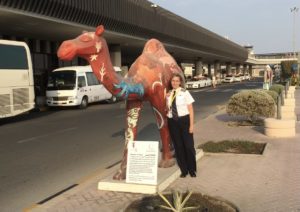 What would your colleagues be most surprised to learn about you?
What would your colleagues be most surprised to learn about you?
When I was 18 years old, I got a job as a flight attendant with Iberia Airlines to earn money to pursue my dream of being a pilot. During this time (in 1989) Pope John Paul II was touring the holy sanctuaries of Santiago and Covadonga on an official visit to Spain. Iberia Airlines was owned by the Spanish government and the airplane and crew were offered for his Holiness’s tour while on Spanish soil. I was selected to be his flight attendant during the three day trip. It was a great honor to be selected and a memory I will cherish forever.
In March 2022, Atlas Captain Aileen Watkins watched from the ground as her 14-year-old daughter, Katalin, completed her first solo flight in a Schweizer SGS2-33 glider at Treasure Coast Soaring Club in Vero Beach, Florida.
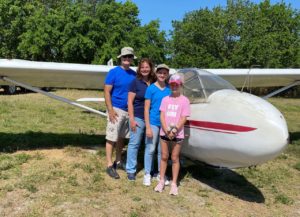
Captain Aileen Watkins and her family on Katalin’s (second from right) First Solo day.
“It was exhilarating for me to see Katalin accomplish her first solo flight,” said Aileen. “Just because aviation was my passion, doesn’t mean it has to be my children’s as well, but Katalin has found her path on her own and wants to fly.”
While Aileen was careful not to “push” her own children into aviation, she leads by example, and is committed to supporting the aviation dreams of as many young girls as possible through her volunteer service with a number of organizations. The 99s, GirlVenture, The International Society of Women Airline Pilots, and Women In Aviation International are all focused on encouraging females to pursue careers in aviation.
“There are so many people who are really enthusiastic about aviation,” said Aileen. “They want to do this so badly and they just need one person to tell them they can do it and to show them how to get started.”
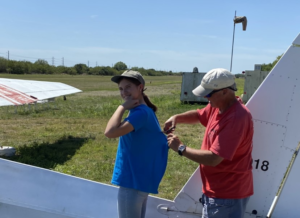
Traditional cutting of the shirttail for Katalin’s First Solo.
Aileen leverages her successful career in aviation to shine a spotlight on the opportunity for others, attending many events to network with, and encourage, the next generation of aviators. In 2018, she was the keynote speaker at a Girls in Aviation event hosted by the Houston Chapter of Women in Aviation, where she talked about her path to become a 747 Captain. She has also been a panelist on aviation careers and balancing career and family at multiple Women in Aviation Conferences.
Aileen’s own journey into aviation began when her father took her to JFK Airport in 1971 and she saw her first 747 up close.
“At that time, there were no women flying for airlines in the U.S.,” said Aileen. “I knew I wanted to pursue aviation, but most people immediately thought of men when they thought of airline pilots. There were so few women in the industry, I really didn’t have female role models to look to for inspiration.”
That changed in the late 1980’s when Aileen was watching a documentary, “Reaching for the Skies,” which featured Captain Lynn Rippelmeyer, the first woman to fly the Boeing 747.
“Seeing a woman in a pilot’s uniform confirmed my dreams were possible. I knew I could do it too,” said Aileen.
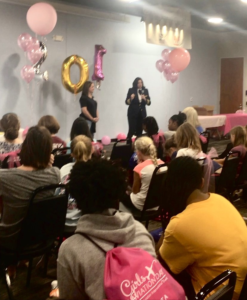
Captain Watkins speaking at Girls in Aviation Day, sponsored by the Houston Chapter of Women In Aviation International.
Today, Aileen is an inspiration to so many young women who are looking to launch their own careers in aviation. As a member of The 99’s Professional Pilot Leadership Initiative, Aileen participates in a formal mentoring program for women who want to progress to become professional pilots. The program aims to accelerate the advancement of women in all pilot professions, facilitate dynamic support, and enhance women’s leadership roles in the aviation community.
“When we created the program, we saw a need for a formal means of mentoring the professional pilot. It’s not enough to lead them to the positions. We want to perpetuate their trajectory by teaching them to lead in their career path and in turn mentor those who will follow.” said Aileen. “We have mentored many women who are now flying for major airlines as well as guiding professionals in other aviation disciplines.”
Another program Aileen is passionate about is GirlVenture. The program, sponsored by the Experimental Aircraft Association at AirVenture Oshkosh, is a four-day camp for young women, grades 9-12, introducing them to the world of aviation and aerospace.
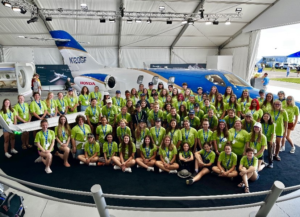
Each year, the Experimental Aircraft Association, AirVenture (in Oshkosh, WI) sponsors GirlVenture – an aviation experience for young women grades 9-12. This is one of the organizations Capt. Watkins is involved in.
“Mentors from many walks of aviation life immerse the girls in the many career opportunities available to them, while providing the catalyst to make new friends and share ideas in an inclusive environment,” said Aileen. “Next year (2023) will be GirlVenture’s 20th year, and is one of my favorite programs to participate in. I first went in 2012, and this year, Katalin was accepted into the program!”
Aileen’s younger daughter, eleven-year-old Alianne, is interested in engineering and aviation maintenance herself, a pursuit Aileen is thrilled to support.
She and her family have recently joined the Civil Air Patrol (CAP) to further get involved in promoting aviation in their community. Through leadership, mentoring, and educational activities, Aileen and her husband, Bob, will be working with CAP cadets to enhance learning objectives in high performance team-building in community service, technology, and search-and-rescue training.
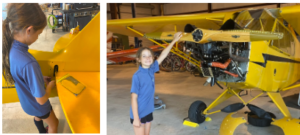
Capt. Watkin’s 11 year-old daughter, Alianne, assisting with their family J3 Cub Annual Inspection, Palm City, FL.
“Mentoring is all about paying it forward,” Aileen says. “I have a passion for flying and aviation and want to share it with others to help them reach their goals. If you love flying and it moves you, there is no limit to what you can achieve.”
First Officer Chris Higgins understands the importance of building the pipeline for future pilots with people from diverse backgrounds and life experiences, and he has made it a personal mission to bring more women to the field.
Chris, who is from Australia, lends his voice and talent to encourage more young women to pursue their dreams in aviation and to advocate for them once they enter the field.
Aviation has been a lifelong passion for Chris. In 1988, at the age of 21, he became the youngest pilot to fly from New Zealand to Australia. An accomplished aerobatic pilot, Chris moved to the U.S. in 1990, flying an air ambulance until 1995, when he joined Trans States Airlines to fly Jetstream 41 and ATR 42/72 turboprop airliners. He went on to serve as Flight Crew Training Instructor at US Airways for Boeing 757/767s and began piloting corporate jets in 2000. Since December 2021, he has been flying 747s for Atlas, a move he wishes he’d made 10 years sooner.
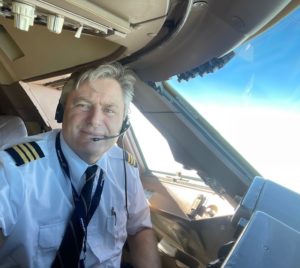
In his down time, Chris shares his passion for flight with young hopeful pilots as a private flight instructor. He said he recognizes the need to go further in providing opportunities for young women, who historically do not see themselves well represented among the pilot ranks. To help remove some of the financial barriers to entering the field, he has been known to offer flight lessons to beginners free of charge.
“I feel very passionately about teaching the next generation of pilots to fly. It’s almost a civic duty – or patriotic duty,” said Chris, who is married with three adult sons. “We need inclusion. We need more pilots, and we need pilots who can bring different perspectives.”
Growing up in Australia as the son of a single mother trying to hold on to their family farm, Chris saw the injustices she faced simply because she was a woman. Throughout his career, he has worked to right those injustices through efforts grand and small – whether it be financing his female flight students’ trips to attend Women in Aviation conferences or amplifying a social media post that celebrates the accomplishments of the first Emirati female captain.
“Please believe in humanity,” he wrote, sharing a LinkedIn post about Captain Aisha Al Mansoori by Aviation Business Middle East. “If we all work together, we can make things better for many generations to come. #womeninaviation #equalrights #pilotshortage #courage #leadership #tolerance.”
Chris said advocating for women in aviation takes many forms – from outreach to encourage young women to envision themselves in a cockpit to ensuring they are empowered to lead when they get there.
“Everyone has a lot of hopes and a lot of dreams, and I really want people to succeed,” he said.
“When you help them develop their confidence, their communication style improves, they have the courage.”
Chris’ success as an instructor has been well-document in his local media outlets. One of his stand-out students, a then-17-year-old pilot-in-training from the Pittsburgh area, was featured on the city’s local news broadcast for her aerobatic flying – skills she learned from Chris – and her ambition to pursue a career as an airline pilot. She is now working toward that goal on a full-ride scholarship at the Ohio State University. Another of his former female students is training to be a fighter pilot with the U.S. Air Force.
Chris said he only takes on students who aspire to pursue a career as a professional pilot or in the military, and he incorporates aerobatic training instruction with all of them.
“Aerobatic training brings a lot of flying fundamentals that may be lacking in modern training,” said Chris, who test pilots’ airplanes and experimental aircraft. He is known by his neighbors as the pilot occasionally seen flying aerobatic maneuvers in the sky above their hometown of Ligonier, Pa. “It builds confidence and builds a skill I call mechanical aptitude. When automation fails, and all that is left is a good pilot, they are not left wanting.”
Alynn Copely, one of Chris’ current students, is only a few solo flights away from her check ride to earn her private pilot license. The 17-year-old said she feels ready to make that leap – and to follow the path to become an airline pilot – because of the strength and skill she’s gained through training with Chris.
“Chris helped me build confidence in myself,” Alynn said. “He has taught me valuable lessons, not just about flying but about reaching inside myself and finding dedication to flying. He is an advocate for female pilots. He gives females the same respect and opportunities as any male student. I can’t say that about all instructors. He is very encouraging. He has given me a lot of advice about the corporate world, about what you may face being a female aviator.”
Chris said he is counting on well-trained, self-assured young women like Alynn to be role models for future generations of female pilots.
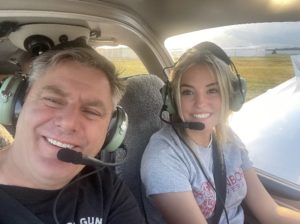 “We need more female pilots who are seen and widely known,” he said. “The Air Force is doing a good job with that; they have a lot of women who fly now. It is improving, but I think it will take some time. We aren’t there yet.”
“We need more female pilots who are seen and widely known,” he said. “The Air Force is doing a good job with that; they have a lot of women who fly now. It is improving, but I think it will take some time. We aren’t there yet.”
In celebration of Hispanic Heritage Month, observed every year from September 15 – October 15, InsideAtlas will highlight our Hispanic colleagues who share how their culture has shaped them. Today we introduce you to Federico ‘Freddy’ Mendoza. 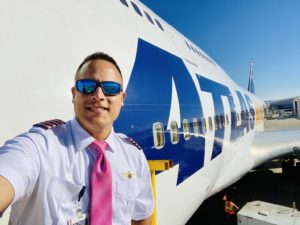
What is your current title and how long have you been at Atlas?
I am a Captain and Line Check pilot on the 747. I celebrated 11 years with the Company in April.
What are your primary responsibilities in your role at Atlas and what is your favorite part about the job?
A line check in aviation is a pilot’s final exam, or skill test.
As a check pilot, I am entrusted to carry out SOPs (Standard Operating Procedures) amongst the pilot workforce by conducting Annual Line Checks for Captains and train new hires through OE (Operating Experience) so they can be line qualified pilots and begin assisting the Company with future flight requirements for our customers. Atlas Air entrusts me to be an ambassador for their brand wherever I go, and I take that seriously.
My favorite part about this role is when a new hire figures out how to safely operate and land this jumbo plane and can be officially released from training.
How did you find Atlas?
I flew heavies (bomber, cargo and tanker aircraft with a takeoff weight of at least 300,000 pounds) in the United States Air Force. I became quite familiar with the brand as I often saw Atlas planes on the airfields I was on. I had a friend at the Company who helped me get my resume in front of the right people and fast forward to today, Atlas is the only airline I’ve been with, outside of the military.
What do you like best about working at here?
The extensive variety of flying Atlas does is fantastic. That’s been so interesting. Also, given my background, I have found the military charters to be very rewarding. I’ve done a wide range of military movements, including our first B747 charter into Bosnia, several CRAF missions and most recently, I flew relief supplies to provide assistance to Ukraine. Having the privilege to fly several of my military colleagues has been a bit surreal to take on while wearing a new and different uniform.
How did you find your way into aviation? What prompted you to consider aviation as a career?
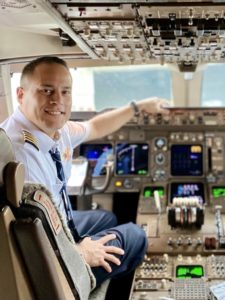
Growing up, I was a military brat. My father was in the United States Army, and we went to air shows a lot. It was quite easy to become infatuated with airplanes and the idea of flying them. My dad put me in touch with some pilots to learn more about aviation and I eventually received an ROTC scholarship, which enabled me to compete for a Pilot slot in the Air Force. I was awarded a slot in 1997 and flew with them until my retirement in 2020 as a Lt Colonel.
What is the best part about working in aviation?
Having a unique job that takes extreme focus and technical skills. I am proud to be a role model for children who might think a particular career is unattainable because it looks “hard.” I want to give children, including my own, hope and direction that they too can do hard jobs, like flying aircraft.
Please tell us about your Hispanic heritage and how your culture inspires you?
I am Mexican American and one of approximately 50 first cousins with over 30 Tios and Tias. This translates into a huge melting pot of experience, values and morals. Being surrounded by all of these family members as a child provided me with so much to draw upon and be inspired by.
If I were to describe my culture or my family in one or two words, I would say’ hard working.’ We don’t look for excuses – we recognize that it takes work to get something accomplished. My family includes farmers, teachers, law enforcement officers and members of the military. Everyone rose through the ranks from the bottom up. And it took a lot of hard work.
I am the first pilot in my family. I drew inspiration from my family and their achievements – it helped me keep my dream alive. This has been my focus with my daughters to reach for the stars. They see all the dedication involved with my career and how hard it has been to attain. I only hope it will inspire them to be even bolder in their aspirations for life.
Tell us a little bit about your upbringing and the values instilled in you.
Family is everything. As I mentioned I’m part of a very large, extended family. It was the village model that raised me and kept me on the right path. Today, although we’re a bit more spread out, family gatherings remain very important, and we try to get together as much as possible. My daughters are always amazed by how large our family is. They love their cousins, like I do mine.
There’s a lot of love, support and pride from my family that continues to motivate me to be better than I was the day before and not to give up. Following this support, I try and give back to others as much as possible.
What would your colleagues be most surprised to learn about you?
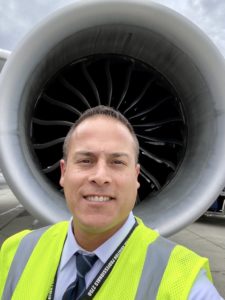 I consider myself an open book, so I’m not sure if there are too many surprises left. I am a big comic book nerd – Batman is my favorite – and I’m an extreme fan of the 80s. Those were simpler times. When it comes to music, TV, movies, or cartoons, I tend to gravitate towards those from the 80s. It puts a big smile on my face – cue “Don’t Stop Believin’” by Journey and I dare you not to smile! Just ask my daughters who are forced to relive all my ‘80s nostalgic memories.
I consider myself an open book, so I’m not sure if there are too many surprises left. I am a big comic book nerd – Batman is my favorite – and I’m an extreme fan of the 80s. Those were simpler times. When it comes to music, TV, movies, or cartoons, I tend to gravitate towards those from the 80s. It puts a big smile on my face – cue “Don’t Stop Believin’” by Journey and I dare you not to smile! Just ask my daughters who are forced to relive all my ‘80s nostalgic memories.
Atlas Air Scholarship Fund’s inaugural employee dependent scholarship program drew an impressive group of candidates. The 10 recipients of $3,000 scholarships are students from diverse backgrounds, pursuing lofty goals ranging from entertainment and politics to aviation and medicine. The program was administered through Scholarship America, which selected the recipients from the pool of eligible applicants, all dependents of Atlas’ U.S.-based employees. We congratulate the recipients and their proud parents.
After he lost his grandfather to pancreatic cancer, Robert knew he wanted to devote his life to medicine. This fall, he will begin his freshman year studying biology on a pre-medicine track at the University of Pittsburgh.
“I am extremely honored to be chosen as a recipient of this scholarship and thankful to Atlas Air for their generosity,” said Robert, 17, who hopes to become an anesthesiologist or a pediatric dermatologist. “After seeing my grandfather go through such pain with pancreatic cancer, I am determined to help those who are suffering and find ways to heal. This scholarship will help to alleviate the large financial burden of college and get me one step closer to my goal.”
Connie Conti, Director IT Business Services Tech Ops and Safety, is Robert’s very proud mother.
“Robbie has worked extremely hard, and he has developed an incredible work ethic that will take him far,” Connie said. “We are so proud of all his accomplishments and, more importantly, the kind young man he has become. We are grateful to Atlas for providing this opportunity and their generous support to our family during this exciting time in our son’s life.”
***
Growing up, Madeline was inspired by her father Check Captain Chris Goussios and his work flying 747s for Atlas Air. Now, as a junior in Kent State University’s aeronautics program, she aims to follow in his footsteps.
“My dad and his career at Atlas have played a big role in my decision to pursue aviation,” said Madeline, 20, who lives Howland, Ohio. “I remember as a small child when my dad was going through training at Atlas. When he would tell me about his trips, how great the people he works with are and how much he appreciated the aviation community – and when I started flying myself right out of high school – I knew I was sold.”
Chris is proud of his daughter’s accomplishments and her drive to pursue her dream of a career in aviation.
“Madeline is so dedicated to her education and her goal of becoming a professional pilot. She works tirelessly to achieve her goals,” he said. “We are very grateful for this scholarship and proud to be part of the Atlas Air family.”
***
A passion for art drives Captain Jwalant Bakshi’s son Vinay as he pursues his education in graphic design at Chapman University in Orange, Calif. He hopes to build a freelance art and design business and, eventually, use his talent in the film industry.
“We greatly appreciate that Vinay’s hard work is being recognized,” Jwalant said. “This scholarship is a very real benefit for us to save some money, and in turn it helps Vinay pursue his goals.”
Vinay said the scholarship has special meaning for him.
“I am honored to have been chosen for this scholarship, as it helps me recognize my own skills in certain areas and helps raise my level of confidence,” he said. “Along with this, it feels good to have been recognized by the company that has employed my father for decades.”
***
Training Center Administration Manager Yovankha Untracht’s daughter Emily is studying psychology on a pre-medicine track as a sophomore at Florida International University.
She hopes to complete medical school and meet all the requirements to become a Board-Certified Psychiatrist. She is grateful for the scholarship, which will help her achieve those goals.
“The Atlas Scholarship will not only help me financially this upcoming fall semester, but it has also provided me with a sense of confidence to know that I am able to achieve anything I set my mind to,” said Emily, 18.
Yovankha said Emily has been a source of pride for her family from the earliest age.
“Emily is an amazing young lady, who from a very early age has been very independent, intelligent, determined yet very loving and caring,” Yovankha said. “She has grown up surrounded by our Atlas family, and I am extremely proud to see that her academic accomplishments and hard work are being recognized as one of the recipients of the Atlas Worldwide Scholarship.”
***
Captain Brian King’s daughter Caroline hopes to bring her passion for athletics to a career in sports statistics, and she plans to work toward a Ph.D. in pursuit of that goal.
“In 10 years, I hope to be working for ESPN and analyzing sports data,” said Caroline, a freshman at the University of Florida studying mathematics. “It means so much to have been chosen as a recipient because it represents the founder of Atlas Air’s belief in the power of education. It is a huge honor to represent that.”
Brian said Caroline works to achieve success in and out of the classroom, but her top priority has always been caring for other people.
“My wife Tonya and I are incredibly proud of Caroline,” Brian said. “We are very thankful and honored for Caroline to be recognized for her hard work and dedication… It is so great that Atlas Air is investing in the children of its employees in such a generous way!”
Tony Carter, Atlas’ Production Control Analyst, founded The CMSgt Joleen Dunavin Foundation, in response to the tremendous legacy his sister Joleen left behind.
Chief Master Sergeant (CMSgt) Joleen Dunavin, a 26-year distinguished veteran of the United States Air Force recently passed away after a valiant fight with breast cancer.
The mission of the charity is to “pay it forward” and support charities important to Joleen. The charity’s first event was the First Annual CMSgt Joleen Dunavin Memorial Golf Tournament on behalf of the Foundation to raise money for The Healing Warriors Program, a nonprofit clinic that provides non-narcotic care services to Veterans and their families. The inaugural event took place on August 19 at PrairieView Golf Club in Bryon, Illinois.
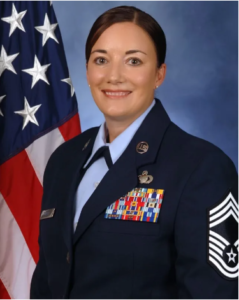
CMSgt Joleen Dunavin
“The Foundation and the Golf Tournament both serve as a way for me to create something that I can attach Joleen’s name to, and have her legacy live on,” said Tony. “I always looked up to her; I can’t put into words how extraordinary she was.”
Growing up, leadership and excellence was in Joleen’s DNA.
“In school, she excelled in both academics and athletics,” said Tony. “Joleen received a full scholarship to DePaul University in Chicago to run track but decided to pursue a different calling and enlisted in the United States Air Force (USAF).”
Joleen’s exemplary military career was marked by a myriad of service awards, meritorious medals and commendations. In addition to her many accomplishments, she completed her career as a Chief Master Sergeant, a rank that a mere 1% of service members attain.
“Tony has worked so hard to get a lot of people involved,” said Michael Carter, Joleen and Tony’s father and Director of Line Maintenance for Asia, Australia, Alaska and Hawaii. “It’s been amazing to watch him honor his sister.”
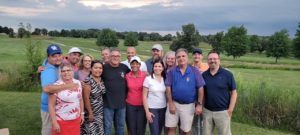
Atlas employees hit the links to support Tony and his family.
Tony added, “Joleen’s compassionate and selfless nature will continue to serve as an inspiration to all those who knew her and loved her. All we can do is cherish the memories and live more like she did. The world was a better place with her in it and given all the lives she’s touched; it will continue to be.”
“I’m very proud the Atlas family was there to be a part of the event,” said Lillian Dukes, Senior Vice President, Technical Operations. “It was very clear that Joleen was quite a special person and has left a lasting impact on those who knew her.”
Click here to donate to The CMSgt Joleen Dunavin Foundation.
CVG Maintenance Manager Sasha Lazic is so passionate about aviation that for the fourth year in a row he used one week of his allotted paid time off to help students learn about the field.
Sasha volunteered his time to help with the Scout Aviation Maintenance Experience (SAME) Program in Oscoda, Michigan.
“Founded in 2019, the program provides summer scholarships to scouts to learn about aviation, and offers hands-on training to students,” said Sasha.
The program was started by Dr. Pete Mapes, a retired United States Air Force (USAF) colonel, chief flight surgeon and flight instructor, along with his wife Nona Mapes, also a retired USAF colonel. SAME is primarily funded through the generosity of Pete and Nona, which awards scholarships with a value of approximately $6,000 each.
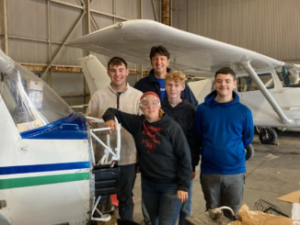
Sasha Lazic, CVG Maintenance Manager, and the 2022 SAME participants.
During this summer’s program, aviation experts, including Sasha, provided students with hands-on experience in avionics, electronics, engine work and airplane maintenance over seven weeks at Oscoda-Wurtsmith Airport (KOSC) in northeast Michigan.
This year, the program began on June 20 in a hangar in KOSC, where four scouts continued the rebuilding of a 1965 Cessna 150E airplane. Over the course of the summer, they disassembled and rebuilt an aircraft engine; installed aircraft systems including brakes, flight controls, fuel lines and aircraft electrical wiring, and learned commercial sewing to manufacture an aircraft interior.
Each week of the seven-week program is led by a different aviation expert. This year, Sasha led week six and taught students to install landing gear and install and rig flight controls.
“Our week-long goal, which we achieved, was to replace all flight control cables and install an engine mount.” The Cessna 150E is being equipped with a supplemental Type Certificate increasing engine horsepower from 100 to 150.
“It’s important to show these future aviators how the planes work from the inside out,” said Sasha. “Today’s planes are all electronic, but the aircraft we work on during this program are much older planes and more manual. The students can move parts and visualize how everything works together. They did an amazing job of accomplishing the goals we set out for them.”
The aircraft each take two to three summers to finish. When they are done, Dr. Mapes takes each scout up in the air to fly the very airplane they successfully rebuilt.
“We want to see kids succeed and show them all different areas of aviation,” said Sasha. “The goal is for them to enjoy the program and hopefully, one day, to find a career in the field.”
Editor’s Note: At Atlas, we know our industry is dependent on the future workforce, and we are investing in talent pipeline development for all aviation professions — from exploration opportunities for K-12 students to supporting career development for adult learners. We also are forging new relationships with aviation colleges and universities developing ways to break down the barriers to employment that many students face. One example is the Road to Giant Pilot Pathway Scholarship Program. This $10k non-returnable, non-binding (not connected to employment) scholarship, aims to encourage those with a love for aviation to continue their education to become professional pilots and to inspire students from under-represented groups to consider opportunities at Atlas Air.
Atlas and Polar employees recently worked with the Los Angeles World Airports (LAWA) to develop and plan the 2022 Aviation Careers Academy (ACE Academy). Middle school and high school students from communities surrounding Los Angeles International Airport (LAX) were invited to a week-long program designed to inspire interest in aviation by showcasing LAX and the many career opportunities available throughout the industry.
This year’s ACE Academy ran from June 20 through 24 and welcomed 80 students representing diverse backgrounds and experiences. Students who registered for the program included 28% who identify as female, 5% who identify as non-binary, 38% who identify as Hispanic or Latino and 22% who identify as black or African American. More than 80% indicated plans to pursue college or university degrees.
The program included four days of online programming and virtual discussions with aviation professionals. The themes this year included General Aviation; Aviation and STEM; and Taking Flight, which featured a pilot panel as well as a discussion of airline operations and aviation security. One day was dedicated to the Future of Aviation. The week culminated with a tour of the Polar Warehouse at LAX for select students who applied to participate.
“There is nothing more inspiring than seeing young people develop an affinity for aviation,” said Camille Fleenor, Vice President of Government Affairs. “We need the next generation of achievers to consider the many opportunities that aviation has to offer. By partnering with LAWA on their ACE Academy, we are showcasing the many careers that make up aviation, including air cargo.
“I am especially thankful for my colleagues who participated in this year’s program including Chief Pilot Laurie Ruiz De Castilla, who participated in the Pilot Panel, along with LAX Polar Station Manager, Erik Sitka, and Senior Director of Security, Jorge Rosales, who were featured during a discussion about aviation careers. Both Erik and Jorge spoke about their education, past work, military experience and the path that led them to their current responsibilities. I would also like to thank Director of Station Operations, Ernie Papagno, and LAX Atlas Station Manager, Jim Li, who helped plan the station tour.”
Erik and Jim led the tour of the Polar Warehouse, which offered the students an up-close walk around a 747-8 as it was being loaded.
“The students were really excited to walk under and around the freighter that was present that morning. I was impressed with the range of questions they had about the plane, the engines and how we plan for and load cargo,” Erik said.
The tour continued to the warehouse, where the students were able to observe a K-9 presentation that showed how highly trained dogs are used for identifying dangerous/prohibited items in the cargo we carry. The warehouse tour also included a showcase of the scales and how cars are driven onto and secured to ULDs (Unit Load Devices).
“It was refreshing to see the level of interest, knowledge and excitement among these young people. It was clear that the students already had a robust interest in aviation, which is what our industry needs,” he said.
To learn more about the 2022 ACE Academy, please visit LinkedIn.
Len Funnell, Maintenance Manager for Atlas Air, has been with Atlas for 12 years. He’s a veteran of The Royal Air Force (RAF) and not one to shy away from a challenge. Len has successfully finished several Ironman races. These races consist of a 2.4-mile swim, a 112-mile bicycle ride and a 26.2 mile run in that order. They are considered one of the most difficult one-day sporting evets in the world.
In his role on the Tech Ops team, Len is responsible for managing all aspects of line maintenance at Atlas’ United Arab Emirates (UAE) station. This includes ensuring Atlas’ vast fleet receives the highest levels of care and maintenance to keep the aircraft operating safely and efficiently for customers.
Most recently, Len has applied his can-do attitude to adventure challenges while raising money to help improve the lives of children.
“It all began in July of 2019,” recalled Len. “My partner, Clare, had done a lot of work with the charity, Gulf for Good, a UAE non-profit that implements sustainable charity projects for children in the developing world. I decided to join her on a trip to Mount Kilimanjaro, which is the highest mountain in Africa.”
The town of Namche Bazaar sits at 11,300 feet above sea level and is the last settlement en route from Lukla to Mount Everest Base Camp. Kongde Ri Peak sits in the background at 20,299 feet above sea level.
After that trip, Len was hooked, by both the personal and physical challenge the trip presented, as well as the opportunity to make a difference. The fundraising Len did for that trip went towards the Larchfield Children’s Home, an official NGO in Tanzania that serves as a safe and secure home for young, orphaned children in Mkuranga.
“If you can do just a little bit to improve the lives of others, that’s a very good thing,” said Len.
Len’s plans to continue to support Gulf for Good were put on hold in 2020 due to the restrictions brought on by the pandemic, but in the fall of 2021, Len participated in the Classic Everest Base Camp Challenge.
The hike was 80 miles round trip. It started in Lukla, a small town in northeastern Nepal, 9,400 feet above sea level. The 12-day trek finished at Mount Everest Base Camp, approximately 17,700 feet above sea level.
“Every step was hard work,” Len recalled. “The higher you go, you see fewer and fewer animals that can survive at these altitudes. But the views are some of the most breathtaking ones I have ever seen. The beauty of this area is endless.”
Prior to starting the hike, Len and his fellow trekkers spent the day in Kathmandu to visit with Child Rescue Nepal, a charity that has been rescuing trafficked children in Nepal since 1999.
“We met the children this organization is working to keep in school and out of the hands of traffickers. It was incredibly moving to see firsthand the impact our funds would have on the lives of these children,” said Len.
These trips have also reframed how Len approaches his work at Atlas.
“On the last two challenges, I spent days hiking with a very diverse group of people in remote conditions,” recalled Len. “In a scenario like that, there are of course going to be some people who are stronger than others. But, we worked together to help each other be the best each one of us could be. I came away with a new purpose to instill teamwork as I saw firsthand how that improves productivity and yields the best results.”
He continued, “I also learned while trekking that everyone has a story and usually they are willing to share it if they are encouraged to do so. I make a point as a manager to bring the same kind of environment to my team to strengthen our relationship and build trust.”
Len’s colleagues are always interested to see what he takes on during his ‘vacation’ away from Atlas. According to his manager, Derek Jackson, Senior Director, Maintenance, he continues to surprise the group with his adventurous travels.
“Climbing Kilimanjaro and the base camp of Everest are major accomplishments for Len,” Derek said. “Working with world cultures like this is part of Len’s personal diversity and inclusion objectives. It has also strengthened his capabilities as an Atlas manager working alongside local support agents in the Middle East.”
Bobby Fraser, Director of Government Affairs and Public Policy, was recently invited to the Commercial Aviation Alternative Fuels Initiative (CAAFI) Sustainable Aviation Fuels (SAF) Summit and Biennial General Meeting to discuss state and regional efforts to develop policy intended to incentivize the use and production of SAF.
The CAAFI® Summit and Biennial General Meeting (CBGM) is a three-day event focused on connecting sustainable aviation fuel (SAF) stakeholders across global industries and sectors and providing a forum to share information and showcase technologies. The event was held in Washington, D.C.
Representing Atlas on the panel, State and Regional Policy Developments, Bobby shared how the company has been engaged in the Kentucky Sustainable Aviation Fuel Coalition with manufacturers, customers and airport partners in Kentucky to push for a state SAF tax incentive.
“The coalition has continued to make progress by educating state legislators on SAF as well as raising awareness of the air cargo industry’s economic impact in Kentucky,” said Bobby. “Consequently, a bill was proposed that will be reintroduced in the 2023 legislative session.”
During the panel discussion, Bobby touched on Atlas’ ESG efforts, the coalition’s background, its strategy to educate on the potential for a hub of SAF production in Kentucky and the proposed legislation for a state SAF tax incentive.
“Atlas is proud to have been an initial member of the Kentucky Sustainable Aviation Fuel Coalition. Our strategy was to come together with leaders of the Kentucky General Assembly, including the transportation committee, appropriations committees, economic development and energy committees and the governor’s office, to talk to those leaders and educate them on what SAF is and the potential for a hub of production in the state,” said Bobby during the panel.
Moderated by Ira Dassa, Director of Environmental Affairs at A4A, Bobby was joined on the panel by Graham Noyes, the Executive Director at Low Carbon Fuels Coalition, and Brendan Jordan, Vice President of Transportation and Fuels at Great Plains Institute.
In closing, Bobby highlighted the next steps for the coalition’s legislative campaign on SAF tax incentives. “We’re continuing to discuss this amongst the stakeholders, engaging with the energy and agriculture industries to hear their feedback, and we’re continuing to work to educate members of the state general assembly on how to move the bill forward.”
“Bobby did a great job representing both Atlas and the coalition’s efforts in Kentucky,” said Camille Fleenor, Vice President of Government Affairs & Public Policy.
To listen to Bobby’s full remarks, please click here.
Atlas Air recently welcomed members of the Bluegrass Chapter of Women in Aviation and the Greater Cincinnati Chapter of Women in Aviation to the Company’s Global Operations Center in Kentucky to learn about our operations and career opportunities.
The group, made up of young professionals in aviation and students of all ages, heard from our world-class team and top leaders in the aviation field. They heard from women leaders in a variety of roles at Atlas Air and CVG to learn about their career paths and toured Atlas Air and airport facilities.
The event also included a Power Panel featuring Patricia Goodwin-Peters, Senior Vice President of Human Resources, Lillian Dukes, Senior Vice President of Technical Operations, Atlas Air Captain Taylor Montgomery, Irene Louth, Staff Vice President, Tax and LaVerne Bowman, Senior Manager, Ground Ops Systems and Development, Standards and Training.
Candace McGraw, President and Chief Executive Officer of the Cincinnati/Northern Kentucky International Airport (CVG) and Crystal Korff with Women in Aviation, a nonprofit organization dedicated to the encouragement and advancement of women in all aviation and aerospace career fields and interests, also shared their insights and experiences with attendees.
“We are excited to connect with young women and highlight the wonderful careers they can pursue at Atlas Air or with our terrific airport partners such as CVG,” said Patricia Goodwin-Peters. “As a leader in global airfreight, we hope to have many of these future aviation professionals join our talented team and support our operations around the world.”
Each year, Atlas Air operates as many as 68,000 flights to 314 destinations in 74 countries, connecting producers to consumers and carrying everything from military equipment to pharmaceuticals, fresh fruit and flowers by operating the world’s largest fleet of 7 47 freighter aircraft and providing customers the broadest array of Boeing 747, 777, 767 and 737 aircraft for domestic, regional and international cargo and passenger operations.
“Our group was truly inspired by the visit to Atlas Air and CVG. As a result of what they saw and heard, we have a few more future Atlas Air employees – including pilots – heading your way,” said Crystal Korff, President of the Bluegrass Chapter of Women in Aviation. “Watching a young person in the moment they realize that they too could be doing that job, like flying a 747 around the world for Atlas Air, still gives me goose bumps!”
“I’m so proud of the Atlas team who supported this important event,” said Leisa Mulcahy, Director, Workforce Development. “From sharing stories to making our guests feel welcome, they served as true champions of our Atlas brand. We have such a rich story to tell, and events such as this one help us shine a light on the rewarding and diverse career opportunities here at the Company. This helps us make progress in our objective to offer equitable access to opportunities here at Atlas and to build a team that drives innovation with different experiences and perspectives.”
Find your local Women in Aviation International chapter here. For more information on available positions at Atlas Air, visit careers.atlasairworldwide.com.
Atlas Air is known for the deep industry knowledge of its world-class team and others have taken notice. Lillian Dukes, Senior Vice President, Technical Operations has been named one of Savoy Magazine’s Most Influential Black Executives in Corporate America for 2022.
“Lillian is an outstanding leader whose focus on data-driven process improvements and predictive analytics has strengthened our team and our company overall,” said John W. Dietrich, President and Chief Executive Officer of Atlas Air Worldwide. “She inspires others with her thoughtful, insightful approach and commitment to safety and efficiency. Lillian’s leadership extends beyond her role at Atlas Air as she is a dedicated mentor, helping others to achieve success and encouraging the next generation of aviation professionals. We congratulate Lillian on her well-deserved honor.”
Savoy is the leading African American business and lifestyle magazine. Savoy‘s Most Influential Black Executives in Corporate America is the definitive listing of African American executives, influencers and achievers impacting corporate America. The selection of the Most Influential Black Executives in Corporate America begins by examining the spheres of influence impacting Savoy’s readership including: corporate sector influence, scholastic achievement, career growth, community outreach and recognition.
Lillian’s leadership extends beyond her role at Atlas Air as she is a dedicated mentor, helping others to achieve success and encouraging the next generation of aviation professionals. She is an Advisory Board member for AWESOME, an organization that focuses on advancing women leaders in supply chain leadership. AWESOME honored Lillian in 2021 with the Legendary Leadership Award. She is an Adjunct Professor and Advisory Board member of the Graduate and Executive Education Aerospace & Defense program in the Haslam College of Business at the University of Tennessee, and also serves on the board of FEJ-USA, a U.S. non-profit supporting community and social development in Haiti.
To learn more about Lillian’s recognition as one of the 2022 Most Influential Black Executives in Corporate America, click here for the summer issue of Savoy.
LGBTQIA+ Pride Month is celebrated each June to honor the Stonewall riots in June 1969 in Manhattan, which helped spark the modern gay rights movement. This month, we are proud to share the story of Tera May, Senior Manager, Talent Acquisition Operations.
For as long as she can remember, Tera has been passionate about connecting with, and helping people.
“When I was four years old, I told my mom that I wanted to be a nun when I grew up because I wanted to help others and make people happy,” Tera recalled.
Flash forward to today, and she has built an entire career around supporting others and making a difference in their lives. Her personal journey has played a huge part in that.
Tera grew up in Iowa in a very traditional, Cuban, Catholic household.
“I wasn’t exposed to many individuals who were part of the LGBTQIA+ (Lesbian, Gay, Bisexual, Transgender, Queer, Intersex and Asexual) community until I entered college. And although I came out early in college to my family, friends and classmates, a big part of me remained hidden early on in my career,” she explained.

Tera and her wife Martha on their wedding day.
Tera’s first professional job was at a company that was particularly conservative. “I enjoyed the work; it allowed me to stretch and grow professionally. The culture however, wasn’t very welcoming or accepting of differences. The innuendos and comments were subtle and discomforting to people who were ‘different,’ so much so, I didn’t feel secure revealing my full self.”
While her colleagues at work shared stories about their weekends with their significant others, Tera remained quiet. When the company held events where families were encouraged to attend, Tera would find reasons not to go. “Connecting with people is so important to me and I’m always the first to raise my hand to get involved,” she said. “So it was very strange to be in this place where I had to consciously make the decision to omit information from others, and not participate like I normally would. I would often overthink what I was going to say so I didn’t slip and mention my girlfriend at the time. I didn’t feel safe, so I chose to leave.”
When Tera considered her next position she was very focused on finding a place where she didn’t have to hide any aspects or her life. She landed a job as the Graduate Assistant for Diversity Recruiting in the Admissions at her alma mater, and led the development and implementation of their diversity recruitment strategy. According to Tera, that was the role that paved the way for her career.
“That role gave me a platform to be a resource for other students and to help create a safe space for them. I made a promise to myself after that first work experience that I would never hide again and to always be forthcoming about who I am.”
Tera continued, “And it became imperative to me that I help others do the same.”
Since then, Tera has held a number of roles in which she’s meaningfully contributed to the DEI efforts of the companies that she worked for, and has received her Diversity & Inclusion Leadership Certification through Cornell University. Her transparency in both the workplace and on social media has resulted in people she’s never met seeking her out for advice on their careers and living authentically.
“I love leading and learning, and often use the hashtag #AlwaysRecruiting, because I genuinely enjoy helping others find their dream job and culture fit – which is why I’ve stayed in the Talent Acquisition space for the last 14+ years. I’ve learned a lot from other people and I have tried to embrace everybody’s stories and support in any way I can,” she explained.
Which is part of why Pride Month is so important to Tera.
“Pride month is about magnifying love for all people. Regardless of how any of us identify, we should be aware of the role we can each play as an ally in supporting your LGBTQIA+ teammates, customers, friends, and family members.”
Tera continued, “Pride Month also means celebrating the fact that I can live my life authentically, out loud, and in full color with my wife and 17-year-old daughter. My wife and I were married on the first day of pride month – June 1 – in 2018, overlooking the Garden of the Gods in Colorado Springs. So, for me, Pride Month is all about inspiring others to be their true selves and creating safe spaces living free of fear.”
And when it comes to Pride at Atlas, Tera is encouraged by what she’s seen in the seven months she’s been with the Company.
“Atlas takes inclusion, innovation and improvement seriously. The Company recognizes there’s work to be done from a Diversity, Equity, Inclusion, and Belonging (DEIB) perspective and is committed to evolving because we want to be better. Our Employee Resource Groups (ERGs), such as the Women’s Network and the Veterans Network, honor different dimensions of diversity.”
“As a half Cuban, part Czech, queer-identifying, millennial female, I have a rich passion for creating inclusive climates and inspiring people to be true to who they are. I thrive on helping others find their voice, find purpose and dream bigger than they ever imagined. I am excited to continuing to do exactly that here at Atlas.”
In recognition of Asian American and Pacific Islander (AAPI) Heritage Month, we’re featuring our talented AAPI-identifying employees across the Company. AAPI Heritage Month is a time to reflect, celebrate and recognize the influence of Asian Americans and Pacific Islander Americans in our history, culture and achievements. Here at Atlas, we celebrate our AAPI colleagues and their contributions.
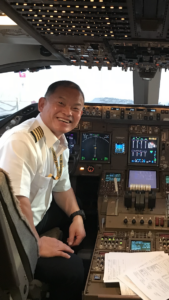
Captain Steve Hong.
This week, we meet Hyung Pyo (Steve) Hong, a 747 Captain at Atlas. Steve is originally from Suwon, South Korea and came to the U.S. in 1981 to study aviation to become a missionary pilot.
What was your career path and how did it lead you to Atlas?
I was born and raised in South Korea. My father owned rice fields near Suwon Air Force Base, and as a child, while I helped my dad in the fields, I loved watching the planes take off and land and dreamed of becoming a pilot.
My family became Christian, and from as far back as I can remember, I wanted to be a missionary pilot. A family we knew from church encouraged me to go to America to get my pilot’s license and recommended a college in Michigan that offered a Missionary Aviation Pilot and Mechanics program. I applied and was thrilled to be offered a full scholarship. During college, I worked in the school’s food service department, where I learned how to make American dishes like scrambled eggs and grilled cheese sandwiches.
Shortly after my graduation in 1988, I was hired as a junior flight instructor for Korean Air, based at Jeju Island (CJU). Four years later, I immigrated to the United States and established residency in Virginia Beach.

Steve took this photo of Hwa Hong Moon also known as “water gates,” a bridge over the Sumoncheon stream in Suwon.
Over the next 15 years, I flew for many different airlines, before landing at Polar in 2007, where I was hired to fly 747s.
How important is it to you that Atlas recognizes Asian American and Pacific Islander Heritage Month?
It is very important to me. Our company operates in so many Asian countries, so it’s especially important to recognize people with AAPI heritage. I’m so grateful that we operate in these countries, as it provides me with many opportunities to return home and reunite with friends and family.
Please share something that is unique about your culture.
I think that what is unique about the Korean people are resilient and persistent; we are survivors. We have been through so much, considering the Japanese occupation during World War II followed by the Korean War, but we still keep going. Despite all these hardships, the present day South Korean economic achievements are an example of our perseverance.
Which traditions are most important to you today?
One tradition I appreciate is respecting elders. It was very important to my father that his children respect our elders and treat them kindly.
Another favorite tradition of mine is Korean Thanksgiving, knowns as Chuseok or Hangawi. It is a mid-autumn harvest festival and a time for families to get together, enjoy good Korean food and have fun. During this holiday, we also visit gravesites to pay our respects to our ancestors and family members.
What’s a fun fact about you – personal or professional – most people at Atlas don’t know?
I think people would be surprised to know that I was a catering service manager for NBC sports during the Summer Olympics in 1988 in Seoul! My ability to both speak Korean and cook American food helped me secure this job.
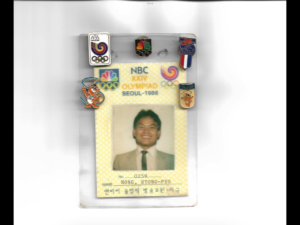
Steve’s security badge from the 1988 Olympics in Seoul.
Do you have a role model or mentor in your life?
When I went to Grand Rapids, Michigan, I met Retired U.S. Air Force Pilot Colonel Clair McCombs, who was a dean of the Mission Aviation department at my college. He was a member of the United States Air Forces in Europe’s (USAFE) first super-sonic aerial demonstration team known as the Skyblazers in the 1960s. When I arrived in Michigan, I had never driven a car and didn’t have any prior mechanical training. But he told me not to give up and encouraged me along the way. I kept in touch with him over the years and was lucky to be able to visit him one last time in the summer of 2021 before he passed away at the age of 94.
Every day, Atlas Air flight crews and pilots cross continents and oceans, balancing everything from weather to target takeoff and touchdown times, freight delivery needs, and compliance commitments.
Working behind the scenes on the ground, striving to ensure all this happens like clockwork, not only at the right place and time, but also with enough time built in, are Atlas Air’s crew schedulers.
“There’s no better way to learn the aviation business and to see how an airline runs than by spending time as a crew scheduler,” said Ryan Piper, Senior Director of Crew Scheduling and Training at Atlas Air. “You touch so many pieces of everything.”
Crew schedulers and air operations analysts – a new role at Atlas Air – have the opportunity to thrive as they support Atlas Air’s complex flight and scheduling logistics operations.
In a single day, a crew scheduler fields hundreds of phone calls and as many emails, interacting with pilots to coordinate schedules for all flights and assigning crew members to those flights.
Crew schedulers work directly with pilots to address issues that may arise during their workday, acting in real-time to support flight crews. This means crew schedulers are responsible for managing the day-to-day flight activities of crew members while also ensuring compliance with department standards.
On any given day, crew schedulers leverage their skills to make calculations and craft strategies based on weather, schedule changes, and the need to re-position flight crews to other stations. It’s up to crew schedulers to keep everything on-track. This includes making sure pilots fly within flight time limitations, which is 30 hours per week, or about 300 to 350 hours per month, and have enough time to meet reset requirements, including resetting a plane’s flight system.
A typical 12-hour shift for a crew scheduler is full of action and problem-solving. Everything they do helps crew members operate safely, efficiently, and in accordance with regulations. That can mean sending a ‘latest out time’ (or latest possible departure time to safeguard all the nuanced needs within the pilot’s flying schedule) to the crew, operations, and dispatch.
“Really good crew schedulers thrive in a busy environment,” Piper said.
For Timea Kovach, a manager of crew scheduling at Atlas Air, the excitement of being a crew scheduler is only second to the excitement of being a pilot. Kovach, who is Hungarian, was the first woman in her country to get a flight-engineer degree along with a private pilot license and commercial pilot license with instrument rating.
But while Kovach felt she had found her calling working in aviation, she decided she wanted a job with less travel after she had children. For Kovach, becoming a crew scheduler offered her a way to stay involved with flights while pursuing a new type of career.
“The job was a perfect fit,” she said. “I loved the connections to the crews and the airplanes, and I loved my colleagues.”
Piper said Kovach exemplifies the mix of aviation knowledge and emotional intelligence required of a crew scheduler.
Atlas Air thanks our crew schedulers and air operations analysts for everything they do.
In recognition of Asian American and Pacific Islander Heritage Month, we’re featuring our talented AAPI-identifying employees across the Company. AAPI Heritage Month is a time to reflect, celebrate and recognize the influence of Asian Americans and Pacific Islander Americans in our history, culture and achievements. Here at Atlas, we celebrate our Asian American and Pacific Islander colleagues and their contributions.
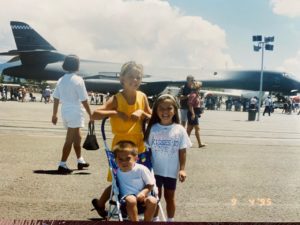
Blythe at an air show in Hawaii with her sister Noel and bother Martin.
This week’s employee spotlight is on 767 First Officer Blythe Lutz. Blythe, who also is an instructor with the Human
Factors team, is from Hawaii. She has been with Atlas since June 2019 and recently married 777 Captain Andrew Lutz.
Hawaii is a unique place because there really is no majority there, everyone is part of the melting pot. My Dad is Okinawan and my Mom is Caucasian, or Haole, in Hawaiian. That makes me Hapa, which means “half” or “part of.” Most of the immigrants came to Hawaii during the sugarcane days. Christian missionaries who married Hawaiians were allowed to own land, which eventually led to the rich business owners overthrowing the Hawaiian Monarchy. Portuguese, Chinese, Japanese, Filipino, Puerto Rican and Korean immigrants came to work on the sugarcane plantations, and after finishing their contracts, most elected to stay.
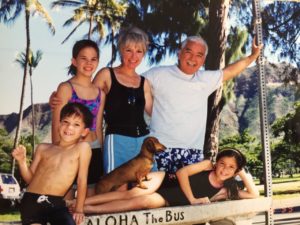
Blythe and her family in Hawaii. This photo was used as their Christmas card many years ago.
Growing up in Hawaii, I was aware that people looked different than I did, but everyone looks different there, so that was normal. I didn’t realize what a special childhood I had until I moved to the mainland for college. I did a lot of typically American things growing up like playing soccer and playing in the Marching Band, but I also was in a Halau and danced Hula when I was young, and I learned to play the Ukulele.
My Dad has been working as a flight attendant for a passenger airline for more than 50 years. He loves working and traveling as a flight attendant, and I observed that. In high school, I was assigned a career project in which I was to interview someone in the field I was most interested in. I came home and announced that I would interview my Dad. I often tell my husband Andrew that it is magic that my parents were able to raise three children in Hawaii on one modest income. My Dad is proud of what he has achieved but wanted more for me, as most parents do. So, he suggested that I become a pilot. He said we would get to fly to the same places, but I’d make a lot more money. Instead of letting me interview him for my career project, he set up an interview with one of the UAL pilots, Stan Snow.
My Dad has so many wonderful qualities, and I feel like I am standing on his shoulders. He is a hard worker and loyal. My intention is to follow his lead and continue to do the best I can every time I come to work.
After flight instructing, I worked at a 135 company flying UPS feeder routes in a C402/4 and a Metroliner. The single-pilot experience of night freight gave me confidence in my abilities.
My arrival at Atlas Air (then Southern Air) appears to be an accident, but I believe everything happens according to God’s plan for me. I applied at Atlas and a passenger airline in Hawaii (which was my preferred choice because I was trying to get back to Hawaii) at the same time in 2019. After interviewing at Atlas in Purchase, I didn’t hear back for weeks. Then I went to interview at the other company, which went well, but they wanted me to have crew experience and jet experience. Still not having heard back from Atlas, I attended the Women in Aviation convention and ran into Scott Anderson, who remembered interviewing me. He said they had been meaning to get back to me and immediately offered me a position on the 737 for Southern Air, to which I replied, “What is Southern Air?”
My intention was to get the 737-type rating and immediately apply to Hawaiian the following year. However, I met Andrew and have really loved working at Southern and now Atlas. The people are amazing, and our work-life balance is great.
Although it has been many years since I moved away from Hawaii for college, I always try to carry the Aloha Spirit in my heart. Aloha means a multitude of different things, but in my heart, it means caring for others and living in harmony with one another.
A bonus fact is that Aloha Spirit is a law that was passed for people who hold public office and work in the judicial system in Hawaii. They must treat their constituents with care and respect.
Today, the most important traditions to me are rooted in my faith in Jesus. I love going home to Mililani, and I am planning on being there much more often on the 767. But my life is no longer defined by being from Hawaii. I will always love returning, but my home now is wherever Andrew is.
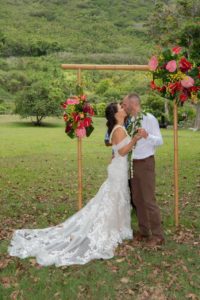
Blythe’s wedding on Sept 4, 2021.
People in Hawaii are able to make fun of each other and also love and respect each other. It is a special equilibrium that more people should appreciate and try to incorporate into their daily interactions. It is so easy to see red when we discuss hot-topic items, but we should remember to take a step back and know that is great that we all have different ideas and backgrounds. How boring would it be if we were all the same?
Atlas Air has launched its Pathway to Success Program for pilots with Embry-Riddle Aeronautical University. Embry-Riddle is the first school to participate in the program through which Atlas Air will recruit, train and hire qualified graduates of Embry-Riddle’s Daytona Beach, Florida Aeronautical Science degree program.
“We are excited to partner with Embry-Riddle Aeronautical University, a leader in aviation education, through our Pathway to Success program for pilots,” said John W. Dietrich, President and Chief Executive Officer of Atlas Air Worldwide. “Atlas Air will further enhance our stellar workforce by recruiting highly qualified pilots directly from Embry-Riddle. Those students will have first access to join our talented team at Atlas Air and fly our formidable fleet of aircraft for our unparalleled network of customers around the world.”
This program is designed to place highly trained aviators into professional positions.
“A key goal at Embry-Riddle is to help graduates secure meaningful, well-paying jobs,” said Dr. Alan Stolzer, dean of the College of Aviation at Embry-Riddle’s Daytona Beach, Florida campus. “We also strive to support the industry by preparing skilled aviators who are exceptional decision makers. Embry-Riddle’s agreement with Atlas Air is well aligned with both of those objectives. It is a win-win for our graduates and for the aviation industry.”
Program Criteria
Embry-Riddle graduates selected to take part in the Atlas Air Pathway to Success program will be granted preferential interviews with Atlas Air. To be considered, candidates must meet these and other criteria:
First Officer trainees in Atlas Air’s Pathway to Success program enjoy benefits including a monthly stipend, medical benefits, 401k, required courses and check rides.
A video introduction and letter of recommendation are among the program’s other requirements. For complete details, and to determine eligibility, Embry-Riddle students should contact Lauren Burmester in Career Services, lauren.burmester@erau.edu.